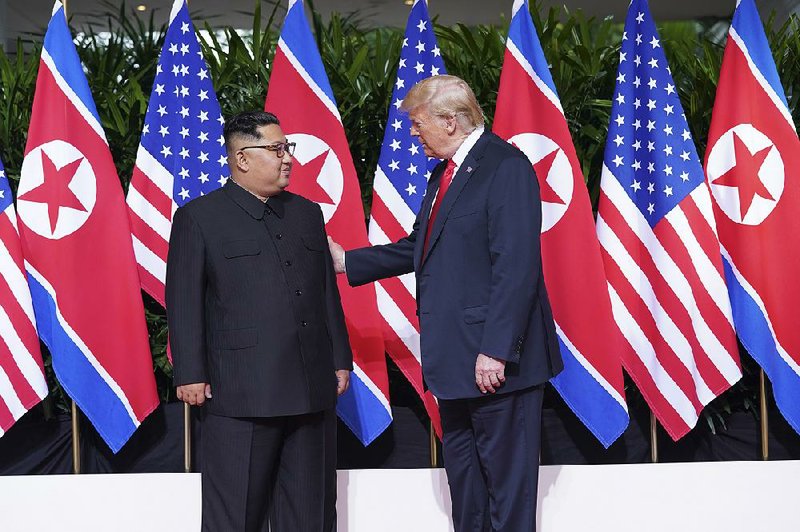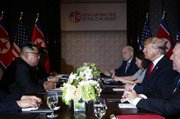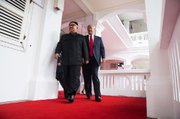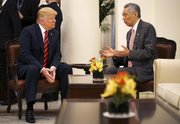SINGAPORE -- President Donald Trump and North Korean leader Kim Jong Un took a first step today toward ending decades of enmity between their countries, shaking hands to start a summit between two adversaries that only last year were issuing threats of war.
With somber expressions, the two men opened their highly anticipated meeting in Singapore, marking the first face-to-face encounter between a sitting U.S. president and a leader of North Korea. They then appeared to warm up, smiling as they chatted after their initial handshake before a row of alternating U.S. and North Korean flags.
"We will have a terrific relationship, I have no doubt," Trump said in brief remarks to reporters.
"We are going to have a great discussion and I think tremendous success," Trump said.
[LATEST: Continuing Associated Press updates on the Trump-Kim summit]
Speaking through an interpreter, Kim said: "It wasn't that easy to come here. We have a past that held our ankles. Wrong prejudice and practices have also covered up our eyes and ears. We have come here after overcoming all those" obstacles.
Aware that the eyes of the world were on a moment that many people never expected to see, Kim remarked that many of those watching "will think of this as a scene from a fantasy ... science fiction movie."
Trump and Kim then held a one-on-one meeting for about 40 minutes, joined only by interpreters. Afterward, Trump said the meeting was "very, very good" and that the two have an "excellent relationship."
Trump made the comments as he and Kim walked together along a balcony as they headed to a larger meeting with top aides. Trump was flanked in the larger meeting by Chief of Staff John Kelly, Secretary of State Mike Pompeo and national security adviser John Bolton. They sat across the table from Kim and his team, which included Kim Yong Chol, who recently met with Trump at the White House.
"I believe this is a good prelude for peace," Kim Jong Un said as the two men sat for that meeting. Trump responded by saying "I do, too." Looking Kim in the eye, he said, "We will solve it; we will be successful."
Later, the leaders and their aides took their places at a long, rectangular table and settled in for a working lunch, chatting over a meal that included beef short ribs, sweet and sour crispy pork, and braised codfish. For that meeting, Trump was joined by Pompeo, White House press secretary Sarah Huckabee Sanders and a few others.
The summit was the product of dizzying weeks of negotiations over logistics and policy. Early today, Trump tweeted with cautious optimism: "Meetings between staffs and representatives are going well and quickly ... but in the end, that doesn't matter. We will all know soon whether or not a real deal, unlike those of the past, can happen!"
Even in the hours before the leaders greeted each other, the two sides shifted their schedules. After Kim made clear that he would be leaving Singapore by the end of the day, the White House announced that Trump would depart this evening after delivering a news conference.
The goal of the summit was to ratify the outlines of a joint statement, to be released before the two men left Singapore later in the day, that laid out a framework for further talks. In the run-up to today's summit, Trump had predicted the two men might strike a nuclear deal or forge a formal end to the Korean War in the course of a single meeting or over several days. But on Monday, Pompeo sought to keep expectations in check.
"We are hopeful this summit will have set the conditions for future successful talks," he said.
Pompeo pronounced Trump well prepared for the meeting, emphasizing that the president was determined not to reward Kim until the North had taken concrete steps toward curbing its nuclear weapons and ballistic missile programs. Complete, verifiable, irreversible denuclearization, he told reporters, "is the only outcome that the United States will accept."
Yet the top U.S. diplomat added that Trump is ready to offer "unique" guarantees to ease the regime's concerns about giving up a nuclear arsenal that provides a deterrent against foreign adversaries while also serving as a key point of national pride.
"I can only say this," Pompeo said. "We are prepared to take what will be security assurances that are different, unique, than America's been willing to provide previously."
Trump spoke only briefly in public on Monday, forecasting a "nice" outcome.
As Trump and Singapore's Prime Minister Lee Hsien Loong sat down for a working lunch at the presidential residence, Trump sounded optimistic, telling Lee, "We've got a very interesting meeting in particular tomorrow, and I think things can work out very nicely."
Kim spent Monday mostly out of view -- until he left his hotel for a late-night tour of Singapore's sights, including the Flower Dome at Gardens by the Bay, billed as the world's biggest glass greenhouse.
The North Korean leader strolled along the harbor as reporters and residents shouted his name and snapped pictures with their phones.
[NUCLEAR NORTH KOREA: Maps, data on country’s nuclear program]
NORTH KOREA'S CONCERNS
On Trump's earlier departure, the White House said the decision was made because negotiations had moved "more quickly than expected," but it gave no details about any possible progress in preliminary talks.
U.S. and North Korean officials huddled throughout Monday at the Ritz-Carlton hotel ahead of the sit-down aimed at resolving a standoff over Pyongyang's nuclear arsenal. Delegates were outlining specific goals for what the leaders should try to accomplish and multiple scenarios for resolving key issues, a senior U.S official said, adding that the meetings were also an icebreaker of sorts, allowing the teams to get better acquainted after decades of minimal contact between their nations.
Alluding to the North's concerns that giving up its nuclear weapons could surrender its primary deterrent to forced regime change, Pompeo said Monday that the U.S. was prepared to take action to provide North Korea with "sufficient certainty" that denuclearization "is not something that ends badly for them."
He would not say whether that included the possibility of withdrawing U.S. troops from the Korean Peninsula, but he said the context of the discussions was "radically different than ever before."
The North has faced crippling diplomatic and economic sanctions as it has advanced development of its nuclear and ballistic missile programs. Experts believe the North is close to being able to target the entire U.S. mainland with its nuclear-armed missiles, and while there's deep skepticism that Kim will quickly give up those hard-won nukes, there's also some hope that diplomacy can replace the animosity between the U.S. and the North.
Led by Sung Kim, a longtime State Department diplomat who now serves as the U.S. ambassador to the Philippines, the American team has also held at least five sessions with the Pyongyang delegation over the past two weeks in the Demilitarized Zone between the two Koreas.
Trump wants the complete, verifiable and irreversible dismantling of North Korea's nuclear weapons program. Kim is seeking a security guarantee -- possibly including a peace treaty formally ending the Korean War -- and the removal of the U.S.' nuclear umbrella protecting allies South Korea and Japan.
Kim has rejected calls to unilaterally give up his weapons in return for economic aid, and instead he has proposed a step-by-step denuclearization process. His public statements and state-run media indicate he wants a deal to ease sanctions but that he won't give up his nuclear weapons until he feels safe enough to retain power without them.
ROLE OF S. KOREA
Before the meeting with Kim, Trump sought to consolidate support from key allies, speaking by phone with South Korean President Moon Jae-in and Japanese Prime Minister Shinzo Abe, who have been in close coordination with the White House for months.
Moon and other South Korean officials watched a live broadcast of the summit before a South Korean Cabinet meeting in his presidential office today.
Moon smiled and nodded as he watched Trump and Kim meet. The South Korean president said he "hardly slept" in anticipation of the summit.
He said he "ardently aspires" for the success of the Singapore summit and hopes it brings complete denuclearization and peace to the Korean Peninsula.
In a statement Monday, Moon welcomed the summit as a "historic milestone" but noted that Seoul must be part of any future negotiations with the North, which he said could take years.
The remarks reinforced South Korea's view of the talks as another step in an ongoing dialogue with Kim rather than a one-time attempt by Trump to reach a deal over Pyongyang's nuclear and missile capabilities.
Moon played a key role in keeping alive contacts with North Korea after Trump abruptly canceled the summit late last month, and South Korea has led parallel talks with Kim's regime over initiatives that include plans to open a quasi-diplomatic "liaison office" in the North.
"The relationship of deep-rooted hostility and the North Korean nuclear issue cannot be resolved in one single action through a meeting between leaders," Moon said in the statement. He predicted a "long process that could take one year, two years or even longer" to resolve disputes with Kim's regime.
Moon said Monday that he expected the Trump-Kim talks to "become a historic milestone on the path toward peace away from war." He also lauded Kim for taking "decisive, proactive action," such as North Korea's claims that it destroyed a key nuclear test site last month.
Fighting in the Korean War ended with an armistice in July 1953. That armistice has yet to be replaced with a peace treaty, leaving the peninsula in a technical state of war.
Information for this article was contributed by Toluse Olorunnipa, Jennifer Jacobs and David Tweed of Bloomberg News; by Zeke Miller, Catherine Lucey, Josh Lederman, Foster Klug and staff members of The Associated Press; and by David Nakamura, Philip Rucker, Carol Morello, Anna Fifield and Brian Murphy of The Washington Post.
A Section on 06/12/2018



